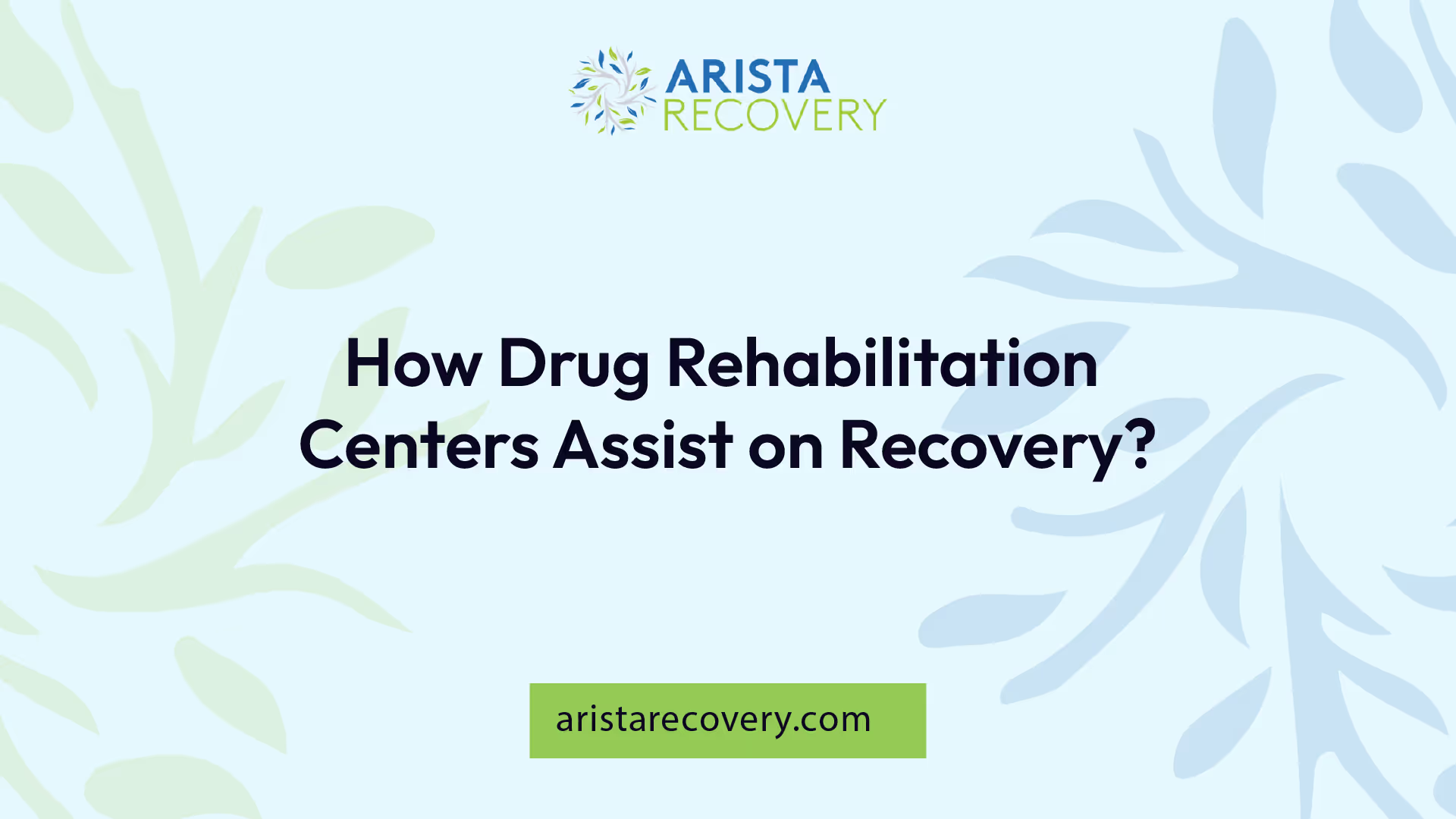How Drug Rehabilitation Centers Assist on Recovery?


Types of Treatment Programs
Drug rehabilitation centers offer a variety of programs tailored to meet the unique needs of individuals seeking recovery. The main types of treatment programs include inpatient programs, outpatient programs, and partial hospitalization programs. Each program serves distinct purposes in the recovery journey, allowing individuals to choose the best fit for their circumstances.
Inpatient, Outpatient, Partial Hospitalization
Treatment TypeDefinitionIdeal CandidatesInpatient ProgramsResidential treatment where individuals live at the facility during the recovery process. This approach provides 24/7 medical support, therapy, and a structured environment.Individuals with severe addiction issues, co-occurring mental health disorders, or those who need intensive support.Outpatient ProgramsFlexible treatment options that allow individuals to attend counseling or therapy sessions while living at home. This can include group therapy, individual therapy, and aftercare support.Individuals with less severe addiction, those transitioning from inpatient care, or those with work/family obligations.Partial Hospitalization ProgramsA step-down level of care between inpatient and outpatient, this program offers intensive treatment during the day while allowing individuals to return home at night.Those who need more support than outpatient programs can offer but do not require full-time hospitalization.
Each program has its own set of goals. Treatment programs generally aim to attain and maintain abstinence, address complex life problems, and prepare patients for the possibility of relapse by recognizing triggers and developing coping strategies. Understanding the differences between these options can assist individuals in making informed decisions about their recovery paths and how drug rehabilitation centers assist recovery.
Therapeutic Approaches in Rehabilitation
Drug rehabilitation centers utilize various therapeutic approaches to assist individuals in their recovery journey. Among these, cognitive-behavioral therapy, family therapy, and motivational interviewing stand out as pivotal methods in promoting long-term sobriety.
Cognitive-Behavioral Therapy
Cognitive-behavioral therapy (CBT) is a widely used behavioral therapy in drug rehabilitation. It helps individuals modify unhealthy behaviors and thought patterns associated with substance abuse. The core principle of CBT is that thoughts, feelings, and behaviors are interconnected, and by changing negative thought patterns, individuals can alter their behavior.
Key features of CBT include:
CBT is effective in empowering individuals to take control of their recovery and has been supported by extensive research in addiction treatment [1].
Family Therapy
Family therapy plays a crucial role in the recovery process by involving loved ones in therapy sessions. This approach facilitates open communication and understanding among family members, allowing them to address challenges together. Some benefits of family therapy include:
BenefitDescriptionImproved CommunicationFamily members learn to express feelings and thoughts effectively.Understanding ChallengesFamilies gain insight into the effects of addiction and the recovery process.Healthier Coping MechanismsDevelopment of strategies to handle difficult situations as a unit.
Engaging the family in therapy promotes a supportive environment, which is essential for individuals overcoming addiction [1].
Motivational Interviewing
Motivational interviewing is a counseling method that seeks to enhance a client's motivation to change by exploring their intrinsic motivations and values. This approach allows clients to find their personal reasons for recovery. Notable aspects of motivational interviewing include:
This technique recognizes that motivation can fluctuate and aims to strengthen the commitment to sobriety through open dialogue.
By integrating these therapeutic approaches, drug rehabilitation centers provide comprehensive support for individuals navigating the challenges of addiction recovery. Each therapy type contributes uniquely to building resilience and fostering lasting change.
Individualized Care in Recovery
Individualized care plays a crucial role in the recovery process. Drug rehabilitation centers utilize a range of strategies to create effective treatment plans for those seeking to overcome addiction.
Tailored Treatment Plans
Drug rehabilitation centers offer a variety of programs tailored to meet the unique needs of individuals seeking recovery. These may include inpatient programs, outpatient programs, or partial hospitalization programs. The selection of a specific program depends on factors like addiction severity, co-occurring disorders, and personal preferences [1].
Each treatment plan is crafted based on the individual's specific circumstances. For instance, Twin Town Treatment Centers formulates plans that consider the substance of choice, severity of addiction, mental health status, and various life situations. This holistic approach accounts for emotional, psychological, social, and environmental factors in recovery.
Ohio Detox Center further exemplifies this individualized approach by offering personalized treatment plans that include 24/7 medical supervision, medication-assisted treatment (MAT), and mental health support such as individual and group therapy sessions, as well as alternative therapies like yoga and meditation.
Personal Goals and Preferences
In addition to tailored treatment plans, rehabilitation centers focus on personal goals and preferences to enhance the recovery experience. Individualized care considers each person's specific needs, which can include factors like addiction severity and co-occurring mental health conditions [1].
By aligning the treatment process with the individual's aspirations, recovery efforts become more relevant and impactful. This personal connection encourages active participation and commitment to the recovery journey, enhancing the likelihood of long-term success.
In summary, drug rehabilitation centers focus on providing personalized care, ensuring tailored treatment plans based on unique needs, and taking personal goals and preferences into account. This approach contributes significantly to the effectiveness of recovery programs and supports individuals in achieving lasting sobriety.
Monitoring Progress in Rehabilitation
Monitoring progress in rehabilitation is a critical aspect of effective recovery. Drug rehabilitation centers use various methods to evaluate individual development and make necessary adjustments to treatment plans.
Therapy Sessions
Therapy sessions play a vital role in the recovery process. Regularly scheduled sessions with trained professionals provide individuals the opportunity to discuss their feelings, challenges, and progress. These sessions can take various forms, including individual therapy, group therapy, and family therapy. Each type of session offers unique benefits, such as a personalized approach or community support through shared experiences.
Type of Therapy SessionDescriptionIndividual TherapyOne-on-one sessions focused on personal challenges and coping strategies.Group TherapySessions with peers that foster connection and shared experiences.Family TherapyInvolves family members to address dynamics that may affect recovery.
Behavioral Evaluations
Behavioral evaluations help assess the effectiveness of treatment methods and identify areas needing improvement. These evaluations can include assessments of the individual's emotional state, coping mechanisms, and behavioral patterns. Drug rehabilitation centers often implement these evaluations periodically, which can inform necessary adjustments in treatment plans.
Evaluation TypePurposeEmotional AssessmentTo identify emotional triggers and mood patterns impacting recovery.Behavioral AnalysisTo observe and measure changes in behavior over time.Coping Strategy ReviewTo evaluate the effectiveness of coping techniques used.
Ongoing Support
Ongoing support is crucial for maintaining recovery and facilitating long-term success. Drug rehabilitation centers provide several avenues for support, including medication management to alleviate withdrawal symptoms and educational programs about relapse prevention techniques. These measures ensure that individuals have the resources needed to handle the challenges of recovery effectively.
Type of SupportDescriptionMedication ManagementSupervised administration of medications like naltrexone or disulfiram to assist recovery.Educational ProgramsSessions that educate clients on relapse prevention techniques and strategies.Support GroupsContinuous encouragement and shared experiences through recovery-focused groups.
Continuous monitoring through therapy sessions, behavioral evaluations, and ongoing support allows drug rehabilitation centers to tailor treatment effectively. This personalized approach helps individuals navigate their recovery journey while addressing the complexities of addiction.
Aftercare and Relapse Prevention
Aftercare is a critical component of the recovery process, providing individuals with the support and tools needed to maintain sobriety after completing a treatment program. Various options are available, including outpatient aftercare treatment, alumni programs, and sober living homes.
Outpatient Aftercare Treatment
Outpatient aftercare treatment involves ongoing counseling or therapy to assist individuals as they navigate mental health issues, develop a relapse prevention plan, enhance communication skills, and find employment. The structure of these programs can vary significantly, allowing for personalized regimens depending on a person's needs and circumstances.
Treatment AspectDescriptionCounseling/TherapyWeekly sessions that focus on individual goals and challengesLength of ProgramVaries; typically ranges from a few weeks to several monthsSkills DevelopmentEmphasis on communication, coping strategies, and job readiness
According to American Addiction Centers, the flexibility and support provided in outpatient treatment make it an essential resource in the recovery journey.
Alumni Programs
Many residential or inpatient addiction treatment centers offer alumni programs designed to support individuals as they transition back into their daily lives. These programs facilitate connections through planned in-person events and activities, enabling former clients to build a supportive network.
Alumni Program FeaturesDescriptionCommunity BuildingRegular gatherings that foster connections among peersContinued SupportOngoing access to counselors and mentorsResourcesTools for managing stress, triggers, and life challenges
These programs aim to help individuals cope with their addiction post-treatment and are crucial in preventing relapse [5].
Sober Living Homes
Sober living homes provide a drug- and alcohol-free environment where individuals can continue their recovery in a supportive setting. Residents are encouraged to actively participate in their recovery journeys while adhering to house rules and engaging in activities such as 12-Step meetings for enhanced outcomes.
Sober Living Home GuidelinesDescriptionDrug-Free EnvironmentStrict policies against substance useRecovery FocusActive participation in recovery-related activitiesAccountabilityResidents are expected to follow house rules and support each other
Living in sober homes can significantly improve the likelihood of maintaining sobriety as individuals adjust to life outside of a treatment facility [5].
By integrating these aftercare options into their recovery plans, individuals can better equip themselves with the tools and support necessary to prevent relapse and maintain their sobriety.
Specialized Therapies and Techniques
Drug rehabilitation centers incorporate a variety of specialized therapies and techniques to assist individuals in their recovery journey. Among these are contingency management, rational emotive behavior therapy, and family or couples therapy.
Contingency Management
Contingency management is a behavioral therapy technique that provides tangible rewards to individuals for positive behaviors associated with recovery. This approach reinforces desirable behaviors by offering incentives based on progress, such as abstinence from drugs and maintaining attendance in treatment programs. Research has shown that contingency management can significantly enhance treatment outcomes, particularly when used in conjunction with other therapeutic modalities [5].
Reward TypeExampleVoucher SystemsGift cards to local storesCash RewardsMonetary rewards for milestonesPrivilege AccessSpecial privileges within rehab
Rational Emotive Behavior Therapy
Rational Emotive Behavior Therapy (REBT) is a cognitive-behavioral approach aimed at helping individuals identify and change irrational beliefs that contribute to their addiction and negative behaviors. By challenging these beliefs, individuals can develop healthier thought patterns and coping strategies, which are critical for long-term recovery [6]. This therapy focuses on emotional regulation and enhances self-acceptance, ultimately allowing individuals to make more rational decisions regarding their recovery.
ComponentFocusDisputing BeliefsChallenging negative thoughtsEmotion RegulationLearning to manage emotionsSelf-AcceptanceImproving self-esteem
Family/Couples Therapy
Family or couples therapy plays a vital role in the recovery process by addressing the dynamics of relationships that can contribute to addiction. This therapeutic approach involves family members or partners in the treatment process, as they can provide support and understanding. It helps to improve communication, resolve conflicts, and foster a supportive environment for recovery [7]. Engaging in this type of therapy can lead to strengthened relationships and a more robust support network for the individual in recovery.
Focus AreaBenefitCommunication SkillsEnhanced dialogue among familyConflict ResolutionLess tension in relationshipsSupport DevelopmentBuilding a supportive network
These specialized therapies and techniques illustrate how drug rehabilitation centers assist recovery by addressing various psychological and relational factors that contribute to addiction. By incorporating these approaches, individuals have a better chance of achieving lasting recovery.
References
[2]:
[3]:
[4]:
[5]:
[6]:
[7]:
You’re not alone in this.
When mental health challenges and addiction intersect, it can feel isolating. At Arista, we offer compassionate, evidence-based, and trauma-informed care to help you heal, grow, and move forward.
You’re not alone in this.
When mental health challenges and addiction intersect, it can feel isolating. At Arista, we offer compassionate, evidence-based, and trauma-informed care to help you heal, grow, and move forward.
Support that moves with you.
You’ve taken a brave first step. At Arista Recovery, we’re here to help you continue with best-in-class care designed for long-term healing and support.
.webp)






